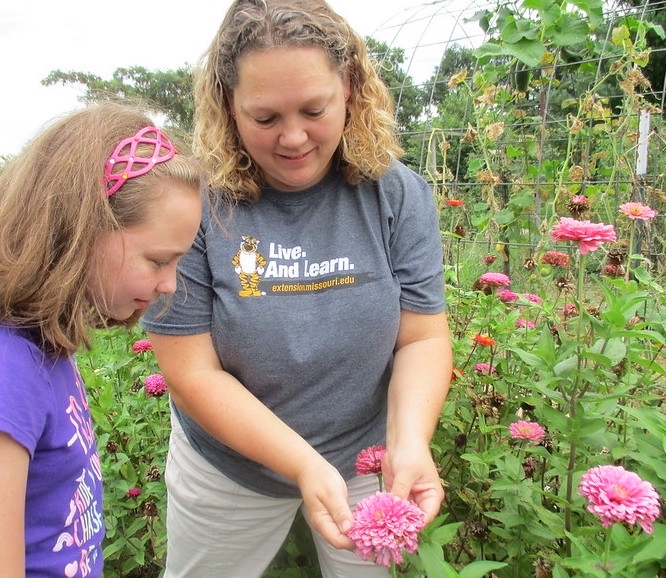Gardening: Good for the body and soul

COLUMBIA, Mo. — April is National Gardening Month and a good time to plant a garden, said University of Missouri Extension horticulturist David Trinklein. Whether strictly for food production or beautifying the home landscape, gardening is one of the most popular activities among households in the United States.
For those who have lacked the motivation to garden, consider the following benefits this popular pastime offers:
Economic. Vegetable gardening is an excellent way to save on the family food bill, Trinklein said. The National Gardening Association estimates that a well-maintained vegetable garden yields an average return of $500 per year. Multiplying by the number of vegetable gardens in the country, the association estimates that American food gardeners produce more than $21.6 billion in vegetables annually.
You don’t have to spend a lot of money to benefit economically from gardening. Intensive (square foot) gardening is an effective way to realize significant economic benefits from small spaces. A recent study by Burpee Seed Co. revealed that $50 spent on gardening supplies can be converted into $1,250 worth of produce annually. This twentyfold return on investment also was documented by a national survey conducted several years ago.
Health. Digging, hoeing, raking and other gardening activities are great forms of exercise. The average gardener burns between 300 and 400 calories per hour while gardening. One would have to walk about four miles at a fairly brisk pace to use up the same number of calories. “Someone once remarked, ‘gardening is a labor of love; a treadmill is just labor,’” Trinklein said in a press release. Also, research has shown that gardening reduces stress, which can lead to health problems of various types.
Gardening is good for one’s health by offering nutritional benefits as well. “Eating fresh vegetables and fruits is known to be important for good health,” he said. “The availability of fresh, inexpensive produce from the family garden is conducive to maintaining good dietary habits and, at times, forces greater vegetable consumption. It has been documented that children are much more likely to consume vegetables they grew themselves than those purchased from a supermarket.”
Psychological. By allowing people to connect with nature, gardening tends to restore our spirits and make us feel good about ourselves, Trinklein said. Simply being surrounded by growing plants and blooming flowers is a way to become immersed in another world and a diversion from the stresses and demands of life. Working with plants tends to draw one’s attention from other problems in life and gives people the opportunity to achieve a level of serenity and enjoyment that often escapes us in our technology-based society, he said.
Planting and caring for a flower or vegetable garden also imparts a sense of accomplishment without unreasonable expectations often placed upon us by society. This is one reason many hospitals and health care facilities now offer plant (horticultural) therapy, which recognizes the healing power of plants.
Environmental. Gardens benefit our planet in many ways. They reduce our “carbon footprint” by growing food locally instead of having it shipped in from distant locations. “Plants take in carbon dioxide as they manufacture food, thus helping to reduce the concentration of greenhouse gases,” said Trinklein. Gardens help to minimize soil erosion by slowing rainfall runoff and allowing it to infiltrate more slowly into the ground. Additionally, gardens serve as a food source and gathering place for many types of wildlife, such as butterflies and birds.
Social. Working together strengthens the bonds between people. Gardening represents a universal language that can strengthen family relationships and is a wonderful way for generations of family members to interact, Trinklein said. The most valuable product from a garden might be the joy derived from working with family and friends.
Gardening can also help bring communities closer together, negating differences that might exist between different groups. Trinklein notes that research has shown that community gardens and urban forests lead to lower levels of crime and domestic violence in cities. Even corporate America is considering the advantages of surrounding people with plants as it emphasizes the importance of landscaping places of business.
Educational. Gardening is a learning experience; every year, gardens provide different challenges to solve. Gardening can encourage children and adults to be more curious about their surroundings and nature. “It is a great way to teach youngsters the joy that can come from work and that positive results are not always instantaneous in life,” Trinklein said. Gardens make us more aware of our senses through stimulation of sight, smell and touch. They have the ability to motivate people in many different ways and serve as a creative inspiration.
According to Trinklein, gardens and gardening remind us of everything that is good about life – the beauty of nature, the feeling of pride and sense of accomplishment for having done something productive and the realization that our efforts are helping to improve ourselves, our society and our environment. “For those of you who are gardeners, best wishes for the upcoming growing season – relish it while it lasts,” Trinklein said. “For those who are not, there is no time like the present to start.”
Miss Clipping Out Stories to Save for Later?
Click the Purchase Story button below to order a print of this story. We will print it for you on matte photo paper to keep forever.

